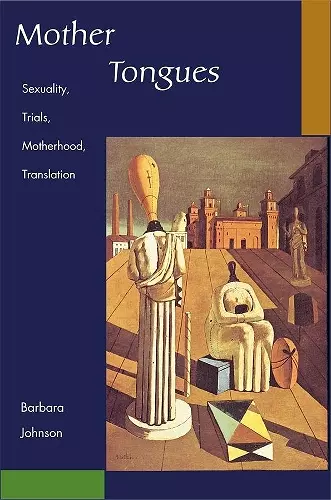Mother Tongues
Sexuality, Trials, Motherhood, Translation
Format:Hardback
Publisher:Harvard University Press
Published:30th Dec '03
Currently unavailable, and unfortunately no date known when it will be back

Mother Tongues is a work of psychological depth and poetic organization. It builds on Johnson's oeuvre by developing new ways of conceiving language and world, most valuably through reinterpretations of Baudelaire, Benjamin, and their reception. Johnson's turn and return to these authors, and the subtle inquiry into the ontological dimensions of language that results, should be of interest to anyone concerned about modernity and its reifications. This book is an elegant, important, and subtle addition to Johnson's searching work, a valuable contribution to Benjamin scholarship and scholarship on modern sexuality, and an idiosyncratic and inventive work of contemporary literary theory and comparative literature. -- Rei Terada, author of Feeling in Theory Mother Tongues offers a set of brilliant, interwoven readings of Baudelaire, Benjamin, and Plath, affirming once again Barbara Johnson's reputation as the most extraordinary of contemporary theorists. In poetry and prose alike, she finds the animated working of a default address, and traces an implicit appeal to the lost maternal or, indeed, to the irrecoverable conditions of language itself. This text weaves its reader into a fine web of writing from which one wants no escape. -- Judith Butler, author of Gender Trouble Barbara Johnson has the most beautiful mind -- subtle, fearless, funny, logical, preternaturally alert to words and their worlds. Mother Tongues encounters central figures of modern culture and the great questions of culture--- why do we read, why do we write, why do we use a mother tongue? Her illuminations are vital and deep. -- Catharine Stimpson, author of Where the Meanings Are
In her most personal and deeply considered book about difference, Johnson asks: Is the mother the guardian of a oneness we have never had? The relations that link mothers, bodies, words, and laws serve as the guiding puzzles as she searches for an answer.
Charles Baudelaire, Walter Benjamin, and Sylvia Plath make up the odd trio on which this book is based. It is in the surprising and revealing links between them--links pertaining to troublesome mothers, elusive foreign languages, and professional disappointments--that Barbara Johnson maps the coordinates of her larger claims about the ideal of oneness in every area of life, and about the damage done by this ideal.
The existence of sexual difference precludes an original or ultimate "one" who would represent all of mankind; the plurality of languages makes it impossible to think that one doesn't live in translation; and the plurality of the sexes means that every human being came from a woman's body, and some will reproduce this feat, while others won't. In her most personal and deeply considered book about difference, Johnson asks: Is the mother the guardian of a oneness we have never had? The relations that link mothers, bodies, words, and laws serve as the guiding puzzles as she searches for an answer.
Mother Tongues offers a set of brilliant, interwoven readings of Baudelaire, Benjamin, and Plath, affirming once again Barbara Johnson’s reputation as the most extraordinary of contemporary theorists. In poetry and prose alike, she finds the animated working of a default address, and traces an implicit appeal to the lost maternal or, indeed, to the irrecoverable conditions of language itself. This text weaves its reader into a fine web of writing from which one wants no escape. -- Judith Butler, author of Gender Trouble
Barbara Johnson has the most beautiful mind—subtle, fearless, funny, logical, preternaturally alert to words and their worlds. Mother Tongues encounters central figures of modern culture and the great questions of culture—why do we read, why do we write, why do we use a mother tongue? Her illuminations are vital and deep. -- Catharine Stimpson, author of Where the Meanings Are
Mother Tongues is a work of psychological depth and poetic organization. It builds on Johnson’s oeuvre by developing new ways of conceiving language and world, most valuably through reinterpretations of Baudelaire, Benjamin, and their reception. Johnson’s turn and return to these authors, and the subtle inquiry into the ontological dimensions of language that results, should be of interest to anyone concerned about modernity and its reifications. This book is an elegant, important, and subtle addition to Johnson’s searching work, a valuable contribution to Benjamin scholarship and scholarship on modern sexuality, and an idiosyncratic and inventive work of contemporary literary theory and comparative literature. -- Rei Terada, author of Feeling in Theory
- Commended for Aldo and Jeanne Scaglione Prize for Comparative Literary Studies 2003
- Nominated for Harry Levin Prize 2005
ISBN: 9780674011878
Dimensions: unknown
Weight: 399g
224 pages